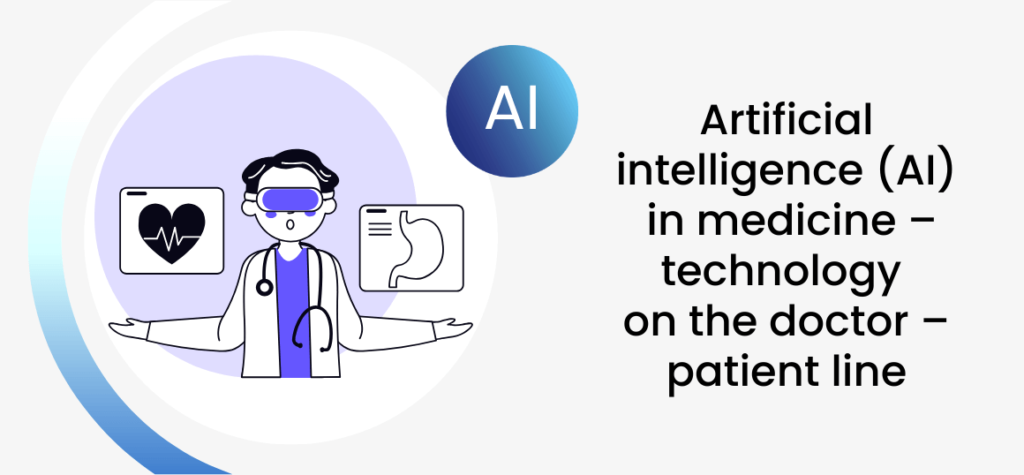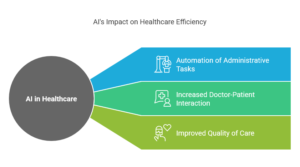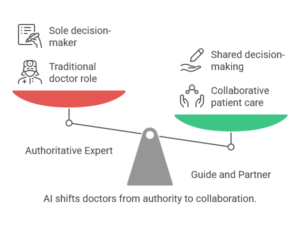Artificial intelligence (AI) in medicine – technology on the doctor–patient line

The doctor–patient relationship in the age of AI: how artificial intelligence is transforming healthcare
The development of artificial intelligence (AI) is impacting many aspects of modern medicine, offering new opportunities for both doctors and patients. While much attention is given to the technological side of these solutions, their influence on the doctor–patient relationship is equally important. Paradoxically, although AI is often associated with automation and the potential “dehumanization” of care, it can in fact support the building of more empathetic, effective, and collaborative relationships. How is this possible?
More time for patient conversations thanks to AI
One of the main challenges in today’s healthcare is the administrative overload faced by doctors. According to OECD data, doctors in Europe spend, on average, more than 50% of their working hours on bureaucratic tasks. Completing paperwork, updating records, or analyzing test results consumes valuable time that could otherwise be spent with patients. AI can automate many of these tasks — for example, through speech recognition and automatic generation of medical notes, processing of test results, or analyzing data from electronic medical records.
The result? Doctors can devote more attention to their patients, focus on conversation, and better understand their needs and concerns — which builds trust and improves the quality of care.

Personalized to understand – a new dimension of communication in healthcare
AI can analyze large sets of medical and behavioral data, allowing for a deeper understanding of a patient’s individual situation. Clinical decision support systems can suggest the most likely diagnoses or optimal therapies to physicians, taking into account factors such as age, lifestyle, or medical history.
Additionally, AI tools can translate complex medical information into language that is understandable for patients, helping them better comprehend their health condition and engage more actively in their treatment.
The result? Patients feel more cared for and treated as individuals rather than just “one of many cases”.
Continuous care between visits – what can fill the communication gaps?
One of the key elements of effective treatment is continuity of care — monitoring a patient’s health outside of regular doctor visits. The traditional care model often relies on sporadic check-ups, which can lead to delays in responding to worsening health conditions. AI-powered medical voicebots, chatbots, and virtual health assistants can be available to patients 24/7. According to an Accenture report, as many as 60% of patients are willing to use virtual health assistants if they provide quick and reliable information. Meanwhile, McKinsey data shows that implementing chatbots in healthcare facilities can reduce unnecessary visits by up to 30%, relieving pressure on the system and allowing for better time management for doctors. Chatbots can answer basic questions about symptoms, remind patients to take medications, attend appointments, or make lifestyle changes, and instruct when it’s necessary to contact a physician.
Thanks to natural language processing (NLP), these chatbots can engage in conversations in a clear and friendly manner, increasing their effectiveness and acceptance among users.
The result? Patients are not left alone between visits — they have round-the-clock access to information, support, and reminders, which enhances their sense of security, improves adherence to medical advice (compliance), and reduces the need for unnecessary appointments.
From measurement to action – real-time medical monitoring
AI is also being used in remote patient monitoring (RPM) systems, which collect large amounts of data from wearable devices such as blood pressure monitors, glucometers, pulse oximeters, or smartwatches. Machine learning algorithms can analyze this data in real time, detecting alarming changes and notifying medical personnel when intervention is necessary.
One example is the Livongo platform, which has helped patients with type 2 diabetes reduce their risk of hospitalization by 28% and improve glycemic control.
The result? Patients feel that their treatment is professional and based on reliable data. This strengthens their trust in the doctor and the healthcare system.
A more supportive doctor – from expert to partner
At its current stage of development, AI cannot replace doctors, but it is transforming their role — from that of an “authoritative expert” to a “guide” and “partner” in the treatment process. Thanks to AI, doctors have access to advanced analytical tools that support diagnosis and therapy planning, but it is still the human who interprets the data in the context of the individual case. Today’s patients are increasingly well-informed and expect to be actively involved in decisions about their health. AI, by providing clear data and forecasts, facilitates shared decision-making. Research published in the Journal of General Internal Medicine found that using AI-assisted decision-making increased patient satisfaction by over 40% and trust in physicians by 25%.
The result? A deeper, more collaborative relationship is formed — one based on trust and partnership.

One example, thousands of possibilities: artificial intelligence in medicine
The Gizińscy Medical Center has demonstrated how technology can genuinely improve patients’ lives. Thanks to the implementation of a voicebot that automatically confirms appointments, as many as 95% of patients now show up for their scheduled visits — which means fewer empty slots and faster access to doctors for others. Additionally, the waiting time to reach the reception desk has been reduced by one-fifth, and the number of missed calls has dropped by nearly 30%. All of this has been achieved by combining AI with a modern telephone system. For patients, this means less frustration, more available appointments, and better communication with the clinic — without the stress of repeatedly calling throughout the day. Though it operates in the background, artificial intelligence makes the entire patient experience more convenient, faster, and more human-centered.
The future of AI in healthcare – what lies ahead?
It is predicted that by 2030, up to 90% of medical facilities worldwide will be using AI-based solutions, enabling doctors to respond more quickly, treat more effectively, and plan care more precisely. Here’s what we can expect:
- Predictive medicine – AI will enable early detection of diseases. For example, AI can identify skin cancer with up to 95% accuracy, rivaling the performance of top dermatologists;
- Real-time therapy personalization – algorithms will analyze data from wearable devices (such as smartwatches and glucometers) and dynamically adjust treatment plans based on a patient’s current health status;
- Digital patient twins – virtual health models of individual patients will be created, allowing different treatment scenarios to be tested without any risk to the patient;
- Full integration with medical records – AI will analyze the entire medical history, combine data from various sources, and support doctors in making decisions based on a complete clinical picture;
- Greater precision and safety in treatment – the WHO predicts that AI could help reduce medical errors by up to 50% in the coming years;
- Improved communication and transparency – doctors, supported by AI-generated data and forecasts, will be able to have more concrete, fact-based discussions with patients about their treatment options.
EasyCall and AI in medicine – a proven partnership
Artificial intelligence can significantly enhance the doctor–patient relationship, provided it is implemented wisely and seen as a support tool, not a replacement for human interaction. The key lies in using technology to free up time, improve communication, and foster empathy — not replace it. When used this way, AI becomes not only a tool of modern medicine but also a catalyst for more human-centered care.
If you manage a medical facility and want to improve patient communication, EasyCall is the solution designed just for you. With cutting-edge technology, including voicebots and AI-based systems, EasyCall automates appointment scheduling, visit reminders, and call handling. Book a free consultation and join the ranks of modern medical centers already benefiting from smart, AI-driven solutions.
